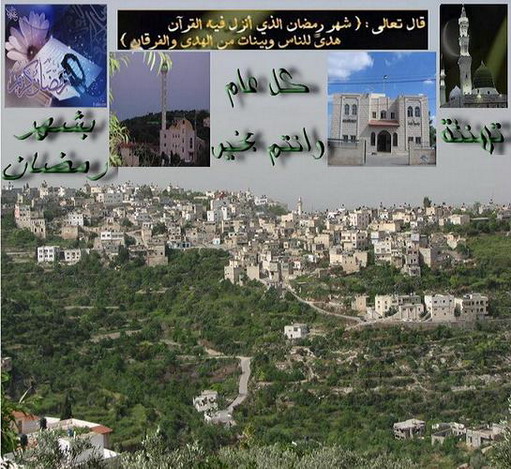الضبع بوكل سمسم the Hyena Eats Sesame
Balaa is my hometown, the village in which my father and my husband were born and raised.
The name Balaa originates from a Soriano word meaning the ؟Sharp Cliff,؟ which is appropriate, considering its 500 meter elevation above sea level. Balaa was celebrated for its superior quality of grapes, figs, and pomegranates, and to this very day, it is still recognized for these fruits.
As in the case of many other usages, certain names have established a sense of permanency among the indigenous tribes of Palestine. Villages recognize Balaa as the village that feeds the Hyena Simsim ؟sesame.؟ الضبع بوكل سمسم
The Balawis had a nickname which was ؟Al-Dhabaa؟ the hyena ؟bokel؟ eats ؟simsim؟ sesame; الضبع بوكل سمسم This was a joke between all the villages. Since the hunting of the hyena was not easy and the hyena usually attacked the herd, chickens, sheep, goats, rabbits, horses, and donkeys, some of the villagers would own dogs or cats to help avert the attacks.
The story behind the ؟hyena ate sesame in Balaa؟ الضبع بوكل سمسم dates back many years to a dispute between a landowner and a farmer from the Hanhan family of the Mahmoud clan ؟hamoulet dar Mahmoud؟, my clan. The landowner trusted the farmer to sell his sesame at the market; however, the farmer was not nearly as trustworthy as the landowner had hoped, and he ended up eating all the sesame before he ever arrived at the marketplace. When the farmer returned and the landowner asked him where the proceeds from the sesame were, the farmer answered, ؟The hyena attacked me and ate all the sesame.؟
Skeptical of the farmer؟s claim, the landowner questioned him again, ؟the hyena ate sesame?؟ الضبع بوكل سمسم Balaa people speak with a distinctive accent, and they wrinkle the end of the word. [As soon as a peasant speaks, his identity is easily recognizable from his accent] The farmer answered again, ؟yes.؟
The story was told and retold among the neighboring villages and ؟Al-Dhabaa bokel simsim؟ الضبع بوكل سمسم became the nickname of choice to satirize the people of Balaa.
Balaa is filled with a labyrinth of tunnels, which stretched out across the land for miles with caves filled with a vast amount of cavernous wonders with their hidden secrets deep within; no doubt, an archaeologist؟s playground. The striped hyena also commonly hid in tombs and caves across the country.
Balaa was crowded with hyenas of all kinds, and various chilling facts about the hyena, such as its powerful jaws, quick speed, and rapid moving digestive system, which could easily consume an entire corpse in minutes, overwhelmed people؟s thoughts. The frightening knowledge that many people of the village were killed by hyenas and that their corpses disappeared under the jaws of a hyena remained at the forefront of everybody؟s mind.
The extremely aggressive and wildly unattractive wild beast, known throughout the village for having the strongest jaws among the animal kingdom, could easily crush the largest of bones in the human body. Since the hyena was such a proficient eater, it could even digest the bones, horns, and teeth of any of its prey, including humans. Perhaps it is the devil, Iblees himself.
The fellahin were very well known for hunting the hyena in Palestine, and they took great pride in proving their power and strength by telling, in great detail, their stories about hunting the dhabaa and hang the skin as the hunter؟s trophy.
The hyena is a clever creature that should bring a chuckle to your heart. They are noisy animal particularly during mating season, and they make a sound that seems, to the human ear, like maniacal laughing.
In Palestine, hyenas were also creatures of myth, who were the protagonists in countless fantastic tales of depravity and horror. Until modern times, reality and myth were so commingled that the hyena ranked as the most misunderstood and most maligned animal in history.
The hyena is no stranger to any part of Palestine, and hunting this creature has historically been regarded as an act of courage and the epitome of manhood. It is known to find a hiding place in old rock-hewn tombs and in the numerous caves of the country, "attacking graves and burrowing into them, even in the close vicinity of towns,؟ as my grandfather would say.
Rana Abdulla - Canada




Post Your Comment
*It should be NOTED that your email address won't be shared, and all communications between members will be routed via the website's mail server.